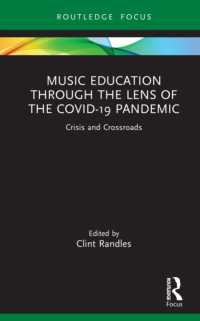基本説明
New in softcover. Hardcover was published in 2007. Brings together three main research areas: those of the study of English as a lingua franca, the development of communicative competence and the use and acquisition of a language bayond a second one in instructed contexts.
Full Description
Eva Alcón Soler Maria Pilar Safont Jordà Universitat Jaume I, Spain The main purpose of the present book is to broaden the scope of research on the development of intercultural communicative competence.
-

- 電子書籍
- ペンギン・ハイウェイ【タテスク】 Ch…
-

- DVD
- ブレイドアンドソウル 2巻






